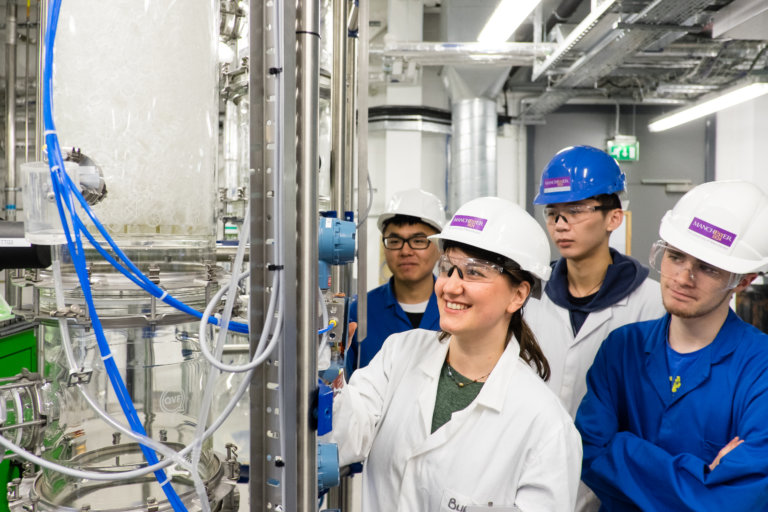
Developing increasingly smaller and faster computer chips. Modernising disease diagnosis and treatment options. Coming up with sustainable sources of energy. Removing trace contaminants from drinking water by reverse osmosis. Discovering food-safety techniques that make exotic fruits and vegetables, fresh meats, seafood, and dairy products always available in our local supermarkets.
The majority of processes and products — the extraordinary and the ones we take for granted — in our modern life owe their existence, in one way or another, to chemical engineering.
In the future, there will be many more frontiers to break. Many of the field’s past achievements came into fruition due to the potent mix of engineers with tools, resources and opportunity. To replicate these achievements, we would need to do the same today.
Universities play an important role in making this possible. From the climate crisis to the development of a vaccine for the COVID-19 pandemic, chemical engineers can get a headstart to solving these global issues by picking the right university.
Here are four universities aspiring chemical engineers can gain the skills and knowledge to turn their talent to future opportunities.
DEPARTMENT OF CHEMICAL ENGINEERING AND ANALYTICAL SCIENCE, UNIVERSITY OF MANCHESTER – UK
Research, teaching and social responsibility — these are the three core goals that set the Department of Chemical Engineering and Analytical Science at the University of Manchester apart from other universities.

Source: University of Manchester
To study here is to be exposed to world-class research from early on. The department is in the top three in the Research Excellence Framework across all categories for chemical engineering. Ninety percent of its research is described as “internationally excellent” or “world-leading”.
Expect teaching in its IChemE-accredited programmes to be as rigorous as the department’s research prowess. In the first year of the Teaching Excellence Framework awards in 2017, the University of Manchester was awarded a Silver.
Facilities complement the dedicated research and teaching that happen here. The 12 million pounds James Chadwick Building houses lab spaces, dedicated computer suites and one of the largest pilot hall facilities in Europe.
The University is also the only UK university with social responsibility as one of its core goals and is top in the UK for its social and environmental impact across its full range of functions, according to the latest world rankings. With a broad spectrum of academic and extracurricular activities for students to contribute to issues of global importance, the university is truly a place for aspiring chemical engineers looking to make a difference in the world.
DEPARTMENT OF CHEMICAL ENGINEERING, BATH UNIVERSITY – UK
Want academic, technical and professional skills to wow interviewers?
Bath University offers Chemical Engineering BEng/MEng and Chemical Engineering with Environmental Engineering MEng. All programmes come with the option of adding a placement year.
The Chemical Engineering BEng provides an introduction to the core principles and practices of chemical engineering. Through lectures and practical lessons, you get to develop your professional skills in engineering, mathematics, science, information technology, research, design, communication and management. Soft skills — such as problem solving, teamwork and resource management — are highly sought-after by employers today and this Bachelor’s will equip you with plenty of it.
A placement year boosts your employability even further. A placement year is a great opportunity to get paid while you learn alongside professional engineers in a commercial environment. It improves confidence and exposes young engineers to new areas of interest.
TECHNICAL UNIVERSITY OF DENMARK (DTU) – DEPARTMENT OF CHEMICAL AND BIOCHEMICAL ENGINEERING – DENMARK
Get the best of both worlds with the MSc programme in Chemical and Biochemical Engineering at the Technical University of Denmark. The programme combines the study of chemical and biochemical industrial technology. There are three focus areas for students to specialise in: Chemical and Biochemical Process Technology; Chemical and Biochemical Product Engineering; and Energy and Environmental Engineering.

Source: Technical University of Denmark
If you’re interested in how the chemical or biochemical conversion of raw materials into products can be exploited commercially or used for sustainable ends, this is the right course for you. An MSc degree in Chemical and Biochemical Engineering from DTU will signal to future employers you have the scientific and technological competencies to translate concepts of new chemical and biochemical products and processes into safe and economically viable production.
What is more, they will know you have the know-how to produce practical efforts to remedy environmental problems and reduce the energy consumption of current production activities
The practical exposure in this programme lies in the MSc thesis. Students will have to collaborate with a large Danish company, a valuable experience that will prepare you for future research and development work at universities or in industry. For more work experience, opt for DTU’s industry study programme where you can combine work and study over a four-year period. Special rules apply.
DEPARTMENT OF CHEMICAL AND PROCESS ENGINEERING, UNIVERSITY OF STRATHCLYDE – UK
One of the major draws for this Glasgow institution is its strong links with major chemical engineering employers worldwide. It’s the ideal complement to its BEng, MSc and MEng courses, all of which are accredited by the Institution of Chemical Engineers.
Businesses work with the Department of Chemical and Process Engineering in various ways, from consultancy and online degree programmes to knowledge transfer partnerships. This close relationship, in turn, provides valuable exposure to chemical engineering students here.
Students not only get access to jointly-funded or contractual research opportunities, but also opportunities for industrial placements, summer projects, conferences, student prizes, equipment services and more.
For example, the university partners with BlueShift International Materials Inc.and the Oil & Gas Innovation Centre for a four-day course that provides training on adsorption fundamentals, from molecular mechanisms up to industrial processes. It is aimed at industry professionals, first-year PhD candidates, or anyone who wishes to improve their knowledge of adsorption-based separation and storage processes.

Source: Shutterstock
DEPARTMENT OF CHEMICAL ENGINEERING, KU LEUVEN – BELGIUM
One of the world’s top 50 universities, according to Times Higher Education World University Rankings 2019. Belgium’s highest ranked university. One of Europe’s oldest and leading research universities. These are the accolades of KU Leuven in Belgium, a research university equipped to satisfy all chemical engineering enthusiasts’ scientific curiosity.
At the postgraduate level, KU Leuven offers an interdisciplinary Master of Chemical Engineering Technology. You will be exposed to fundamental chemical-scientific course units, in addition to coursework in numerous areas, including (bio)chemical/scientific coursework, socio-economics and biotechnology, among others. Opt for a flexible cross-campus elective package or a master’s thesis conducted in either a research-specific or industrial context.
For those interested in sustainability, the Sustainable Process and Materials Engineering option is where students can learn about reliable technology that meets today’s demands, without jeopardising the welfare of future generations.
More inclined towards business? The Postgraduate Programme in Innovation and Entrepreneurship in Engineering offers a dynamic cross-fertilisation between company and classroom through an engineering challenge as the central assignment with a company.
*Some of the institutions featured on this article are commercial partners of Study International
Liked this? Then you’ll love…
Change the world with a degree in chemical engineering
Behind the scenes of exciting biochemical engineering innovation in the US







